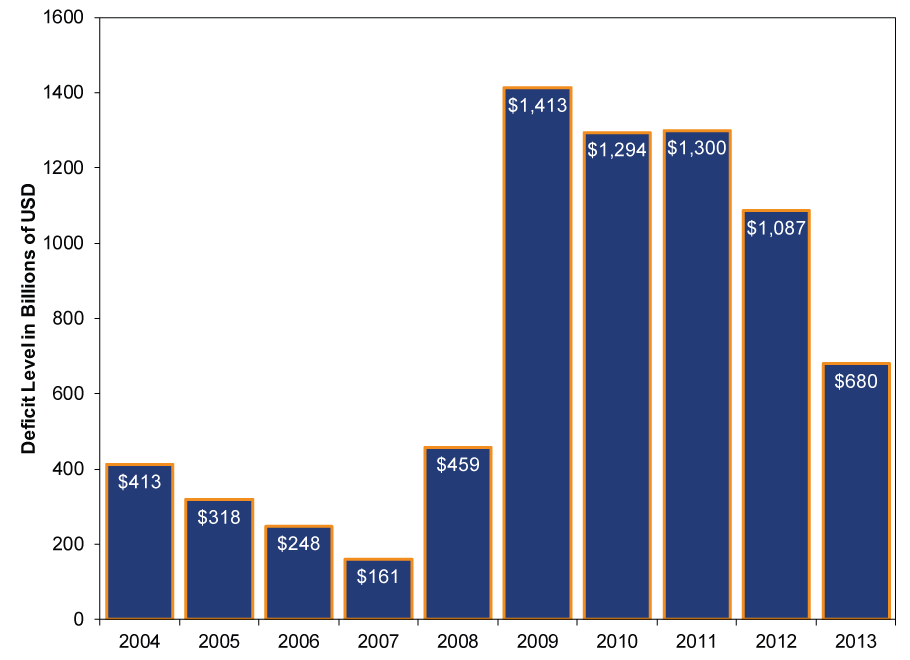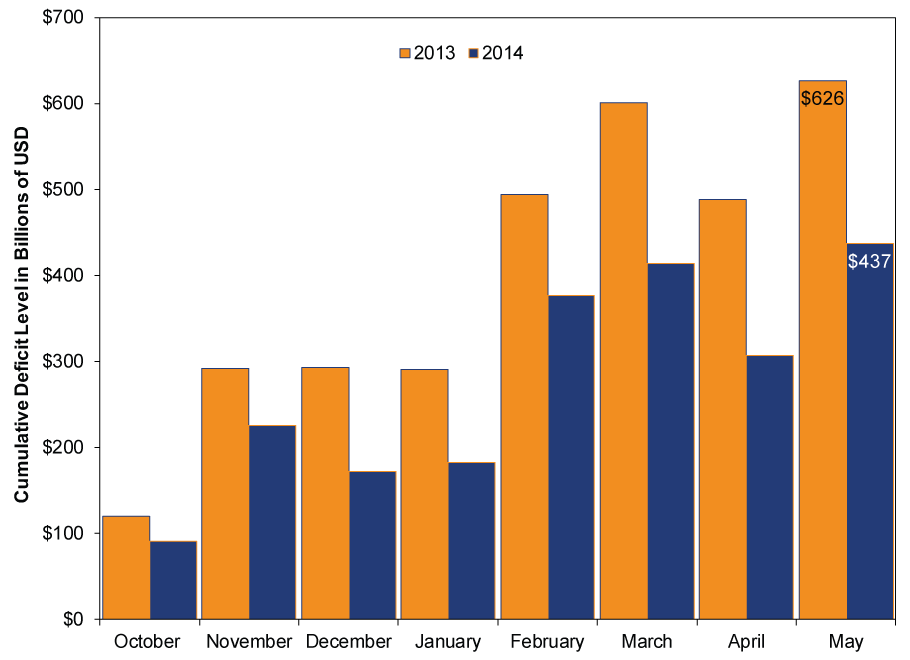Personal Wealth Management / Economics
America Gets All Austere
The Federal budget deficit is way down, and deficit fears should be too.
Guess what? With either a little more deficit trimming, a little more economic growth or a combination of the two, by one measure, the US will soon qualify to join the eurozone!iWhat I’m referring to is the big reduction in the US Federal budget deficit seen in recent years. There is little history of deficits negatively affecting stocks, whatever the size. But if you fear big federal government deficits will soon contribute to bankrupting America, it’s time to reassess those worries.
The eurozone’s foundational Maastricht Treaty mandates member countries’ deficits remain below 3% of GDP, and at the end of fiscal year 2013, the US deficit-to-GDP ratio was a hair over 4%.iiStill a wee bit above eurozone standards,iiibut down from 2009’s peak (trough?) of 9.8% of GDP. On an absolute dollar basis, the deficit has fallen from $1.4 trillion to $679 billion, a 52% reduction. Fiscal 2013 alone had the biggest drop, a 37% y/y reduction from fiscal 2012.
Exhibit 1: Federal Budget Deficit, Fiscal Years 2004 – 2013
Source: Federal Reserve Bank of St. Louis, as of 06/20/2014.
This year to date, the reductions have continued. Through May—eight months into fiscal 2014—the deficit fell further. The deficit stood at $437 billion in May, down from $626 billion through fiscal 2013’s first eight months.ivThat’s $190 billion lower to date, or -30% y/y.vPerhaps this pace of reduction doesn’t hold with four months to go. But it appears safe to suggest the government will run a smaller deficit in 2014 than it did in 2013, which was already far lower than the peak. (Exhibit 2)
Exhibit 2: Cumulative Deficit by Month, Fiscal 2013 vs. Fiscal 2014 through Eight Months
Source: US Department of the Treasury, Financial Management Service, as of 06/20/2014.
Now, some suggest this reduction has come too far, too fast—that slashing government spending reduces economic growth too much. The problem with this logic, whatever you think of the theoretical merit, is the vast majority of the decline is due to revenue increases, not spending reductions. These are effectively an aftereffect of economic growth, not a leading indicator. Hence, it’s a bit of a moot point, unless you wish to argue we should stop the incessant American austerity by instituting tax cuts.
Now, again, the size of the deficit isn’t really very relevant for stocks. But if this is something that has weighed on your mind, perhaps now is the time to set those fears aside.
i This is a joke. There is no government plan for a global currency or a “global currency reset,” (whatever that means).
iiWhile this is a real thing, the Maastricht Treaty’s 3% deficit-to-GDP limit is actually also a joke—many countries have breached this for long periods, including Greece, France, Ireland, Spain, Portugal and even darling Germany. Though many in the media presume it’s actually más strict. (Sorry.)
iiiHarrumph. Again, these are toothless standards.
ivThe US government’s fiscal year runsOctober 1 - September 30.
If you would like to contact the editors responsible for this article, please message MarketMinder directly.
*The content contained in this article represents only the opinions and viewpoints of the Fisher Investments editorial staff.
Get a weekly roundup of our market insights
Sign up for our weekly e-mail newsletter.

You Imagine Your Future. We Help You Get There.
Are you ready to start your journey to a better financial future?

Where Might the Market Go Next?
Confidently tackle the market’s ups and downs with independent research and analysis that tells you where we think stocks are headed—and why.







